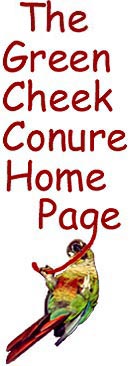 |
Author's Note: This article was written in March, 1998, just
after my first successful green cheek clutch finished weaning. My
green cheek babies must be hand-fed from day one, because their parents
will kill them if they're left in the nest.
My pair had it's first successful clutch, just finished weaning at this writing. We hand-fed from day one, pulling the eggs just before hatching (usually just after they "draw down"). In this case, unlike the pair's previous clutches, every baby except one hatched out on it's own. The eldest one had a dry membrane, and did require some assistence, but still hatched out healthy and kicking! The clutch was quite staggered in age; the oldest was a full 10 days older than the second-oldest, because the parents had cracked 2 eggs in between. At first, we fed a mixture of Pedialyte and Ensure mixed 50/50. We fed this until about 4-5 days, every 2 hours around the clock - although the babies probably could have gone a while longer than that while I slept, I could switch off with my "nocturnal" friend at night, so we could feed pretty much 24 hours around the clock. After the first few days, we switched to a thinned formula (Kaytee Exact), and gradually thickened it up. We fed with a spoon from day one and continued through weaning. Personally, I prefer spoons especially with day ones: I have an easier time eliciting a feeding response (head bobbing, cheeping) than with a syringe or eye-dropper, both of which I've also tried on very little ones. After accidently aspirating one of the chicks from the previous clutches (the only chick to survive long past hatching), I was more than a little scared of feeding such tiny babies again. This time I learned some important things: to stop feeding when the baby stops eating, and to watch very carefully so you can spot when he stops bobbing & swallowing. And to feed very slowly; basically I tipped the spoon up only enough that the formula was sitting near his mouth so he can suck it up! It still didn't take very long to fill those tiny crops! One thing I did notice with the babies early on, was that they were always about a week to a week and a half behind in growth. This started early on; after they got to be a couple weeks old, they started growing at the normal pace, although they were left about a week behind in growth. I assume that this just comes from being fed from day one - perhaps something in their diet early wasn't quite up to speed? They always stayed chubby and healthy throughout, just seemed a little slow-growing those first few weeks. Let me tell you, between the staggered ages and the "prolonged" period in which they stayed quite small at the beginning (we kept up the every 2-3 hour feedings for quite a while longer than usual), I got more than a little tired of feeding babies very quickly! As they got older (and cuter!) they required less feedings and got easier to feed. We did have one accident; they had all been staying in the incubator (an Octagon 20), including the oldest. When he was around 2 weeks or so, he was flapping his wings and one of the wingtips hit the incubator's fan! Fortunately I was sitting right nearby and heard him squeal (you would squeal, too!). I stopped the bleeding, and although it seemed like he had lost a awful lot of blood for such a little guy, he seemed fine, if a little phased. He did have a rather nasty gash on the underside of the wingtip, which at the time was just beginning to sprout pinfeathers. But, it healed up perfectly fine, and within a couple weeks you couldn't even tell it'd ever been there. As they got older and more rambunctious, I did notice they liked to use their beaks a lot - I've heard this from other green cheek breeders, too. When excited about a feeding, they would grab onto me to be lifted out of the fish tank I use as a brooder for older babies - which wasn't exactly a pleasant feeling! Once they got switched to a weaning cage and didn't have to be lifted out, this tapered down quite a bit. But, they still didn't know how to be very gentle; green cheeks are birds that love to use their beaks on anything & everything, and they just didn't know that they shouldn't use too much pressure! Rather like human toddlers who may accidently squeeze or pull on a dog's ear too hard, not because they mean any harm, just because they don't know better and they don't have as much control over their hands. In any case, I pretty much put up with the occasional hard nip (tho I would take my hand away and say "no"), and each baby got over their "nippy phase" just around weaning, or perhaps a little after. In personality, I truly fell in love with these guys. They're very playful; they even wrestle with each other and with my hands! They're also very active, exploring anything and everything before they're sastified and can settle down some. When they do settle down, they're very cuddly; they'll lay on their backs in my hand being scritches, and thoroughly enjoy it. Very, very sweet babies! I'm thinking I'll maybe keep the oldest.... :-) Author's Second Note: I did keep the oldest baby, named "Zach",
and he was a member of the family until he sadly passed away last
year.
This page is copyright ©
1998-2000 Lara deVries
|